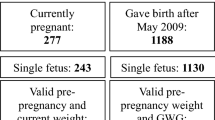Abstract
The goal of this paper was to determine predictors of having a weight gain goal in early pregnancy. In 2008, we administered a 48-item survey to 249 pregnant women attending obstetric visits. We examined predictors of women having a goal concordant or discordant with 1990 Institute of Medicine (IOM) guidelines, vs. no goal, using binary and multinomial logistic regression. Of the 292 respondents, 116 (40%) had no gestational weight gain goal, 112 (39%) had a concordant goal and 61 (21%) had a goal discordant with IOM guidelines. Predictors of a guideline-concordant goal, vs. no goal, included sugar sweetened beverage consumption < vs. ≥ 1 serving per week (OR = 2.4, 95%CI: 1.1, 5.7), physical activity ≥ vs. <2.5 h per week (OR = 3.6, 95%CI: 1.7, 7.5), agreeing that ‘I tried to keep weight down not to look pregnant’ (OR = 14.3, 95%CI: 1.4, 140.5). Other predictors only of having a discordant goal (vs. no goal) included agreeing that ‘as long as I am eating well, I don’t care how much I gain’ (OR = 0.3, 95%CI: 0.2, 0.8) and agreeing that ‘if I gain too much weight one month, I try to keep from gaining the next’ (OR = 4.1, 95%CI: 1.6, 10.4). Women whose doctors recommended weight gains consistent with IOM guidelines were more likely to have a concordant goal (vs. no goal) (OR = 5.3, 95%CI: 1.5, 18.6). Engaging in healthy behaviors and having health providers offer IOM weight gain recommendations may increase the likelihood of having a concordant gestational weight gain goal, which, in turn, is predictive of actual weight gains that fall within IOM guidelines.
Similar content being viewed by others
References
Viswanathan, M., Siega-Riz, A. M., Moos, M. K., Deierlein, A., Mumford, S., Knaack, J., Thieda, P., Lux, L. J., Lohr, K. N. (2008). Outcomes of maternal weight gain. Evidence Report Technology Assess (Full Rep) 1–223.
Siega-Riz, A. M., Evenson, K. R., & Dole, N. (2004). Pregnancy-related weight gain—A link to obesity? Nutrition Reviews, 62, S105–S111.
Gunderson, E. P., & Abrams, B. (1999). Epidemiology of gestational weight gain and body weight changes after pregnancy. Epidemiologic Reviews, 21, 261–275.
Oken, E., Rifas-Shiman, S. L., Field, A. E., Frazier, A. L., & Gillman, A. L. (2008). Maternal gestational weight gain and offspring weight in adolescence. Obstetrics and Gynecology, 112, 999–1006.
Oken, E., Taveras, E. M., Kleinman, K. P., Rich-Edwards, J. W., & Gillman, M. W. (2007). Gestational weight gain and child adiposity at age 3 years. American Journal of Obstetrics and Gynecology, 196(322), e321–e328.
Cogswell, M. E., Scanlon, K. S., Fein, S. B., & Schieve, L. A. (1999). Medically advised, mother’s personal target, and actual weight gain during pregnancy. Obstetrics and Gynecology, 94, 616–622.
Stotland, N. E., Haas, J. S., Brawarsky, P., Jackson, R. A., Fuentes-Afflick, E., & Escobar, G. J. (2005). Body mass index, provider advice, and target gestational weight gain. Obstetrics and Gynecology, 105, 633–638.
IOM: Weight gain: Nutrition during pregnancy. (1990). Part 1. In Book Weight gain: Nutrition during pregnancy. Part 1. City.
Stuebe, A. M., Oken, E., & Gillman, M. W. (2009). Associations of diet and physical activity during pregnancy with risk for excessive gestational weight gain. American Journal of Obstetrics and Gynecology, 201(58), e51–e58.
Palmer, J. L., Jennings, G. E., & Massey, L. (1985). Development of an assessment form: Attitude toward weight gain during pregnancy. Journal of the American Dietetic Association, 85, 946–949.
Parker, J. D., & Abrams, B. (1993). Differences in postpartum weight retention between black and white mothers. Obstetrics and Gynecology, 81, 768–774.
Ogden, C. L., Carroll, M. D., Curtin, L. R., McDowell, M. A., Tabak, C. J., & Flegal, K. M. (2006). Prevalence of overweight and obesity in the United States, 1999–2004. JAMA, 295, 1549–1555.
Conway, R., Reddy, S., & Davies, J. (1999). Dietary restraint and weight gain during pregnancy. European Journal of Clinical Nutrition, 53, 849–853.
Fairburn, C. G., & Welch, S. L. (1990). The impact of pregnancy on eating habits and attitudes to shape and weight. International Journal of Eating Disorders, 9, 153–160.
Dipietro, J. A., Millet, S., Costigan, K. A., Gurewitsch, E., & Caulfield, L. E. (2003). Psychosocial influences on weight gain attitudes and behaviors during pregnancy. Journal of the American Dietetic Association, 103, 1314–1319.
Althuizen, E., van Poppel, M. N., Seidell, J. C., & van Mechelen, W. (2009). Correlates of absolute and excessive weight gain during pregnancy. Journal of Womens Health (Larchmt), 18, 1559–1566.
Claesson, I. M., Sydsjo, G., Brynhildsen, J., Cedergren, M., Jeppsson, A., Nystrom, F., et al. (2008). Weight gain restriction for obese pregnant women: A case-control intervention study. BJOG, 115, 44–50.
Olson, C. M., Strawderman, M. S., & Reed, R. G. (2004). Efficacy of an intervention to prevent excessive gestational weight gain. American Journal of Obstetrics and Gynecology, 191, 530–536.
Polley, B. A., Wing, R. R., & Sims, C. J. (2002). Randomized controlled trial to prevent excessive weight gain in pregnant women. International Journal of Obesity and Related Metabolic Disorders, 26, 1494–1502.
Locke, E. A., & Latham, G. P. (2002). Building a practically useful theory of goal setting and task motivation. A 35-year odyssey. American Psychologist, 57, 705–717.
Author information
Authors and Affiliations
Corresponding author
Rights and permissions
About this article
Cite this article
Tovar, A., Guthrie, L.B., Platek, D. et al. Modifiable Predictors Associated with Having a Gestational Weight Gain Goal. Matern Child Health J 15, 1119–1126 (2011). https://doi.org/10.1007/s10995-010-0659-7
Published:
Issue Date:
DOI: https://doi.org/10.1007/s10995-010-0659-7



